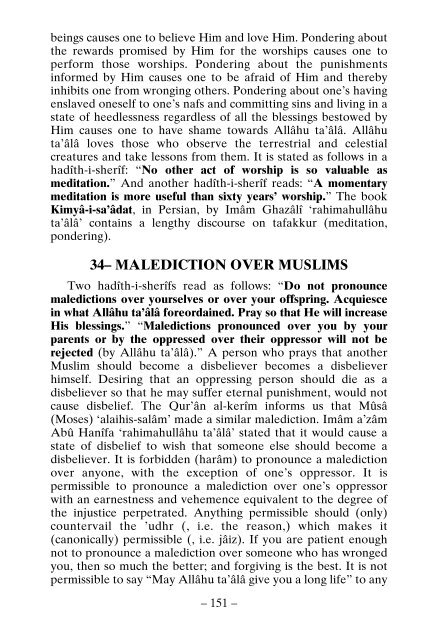Ethics of Islam
Ethics of Islam is taken from the book Berîka by Muhammad Hâdimi. Immorality and ways to get rid of it; 40 depravities and cures to them; usefulness of ethics; what is a soul; strengths of a soul; Personalities emanating from wisdom, courage, chastity and justice are extensively explained.
Ethics of Islam is taken from the book Berîka by Muhammad Hâdimi. Immorality and ways to get rid of it; 40 depravities and cures to them; usefulness of ethics; what is a soul; strengths of a soul; Personalities emanating from wisdom, courage, chastity and justice are extensively explained.
Create successful ePaper yourself
Turn your PDF publications into a flip-book with our unique Google optimized e-Paper software.
eings causes one to believe Him and love Him. Pondering about<br />
the rewards promised by Him for the worships causes one to<br />
perform those worships. Pondering about the punishments<br />
informed by Him causes one to be afraid <strong>of</strong> Him and thereby<br />
inhibits one from wronging others. Pondering about one’s having<br />
enslaved oneself to one’s nafs and committing sins and living in a<br />
state <strong>of</strong> heedlessness regardless <strong>of</strong> all the blessings bestowed by<br />
Him causes one to have shame towards Allâhu ta’âlâ. Allâhu<br />
ta’âlâ loves those who observe the terrestrial and celestial<br />
creatures and take lessons from them. It is stated as follows in a<br />
hadîth-i-sherîf: “No other act <strong>of</strong> worship is so valuable as<br />
meditation.” And another hadîth-i-sherîf reads: “A momentary<br />
meditation is more useful than sixty years’ worship.” The book<br />
Kimyâ-i-sa’âdat, in Persian, by Imâm Ghazâlî ‘rahimahullâhu<br />
ta’âlâ’ contains a lengthy discourse on tafakkur (meditation,<br />
pondering).<br />
34– MALEDICTION OVER MUSLIMS<br />
Two hadîth-i-sherîfs read as follows: “Do not pronounce<br />
maledictions over yourselves or over your <strong>of</strong>fspring. Acquiesce<br />
in what Allâhu ta’âlâ foreordained. Pray so that He will increase<br />
His blessings.” “Maledictions pronounced over you by your<br />
parents or by the oppressed over their oppressor will not be<br />
rejected (by Allâhu ta’âlâ).” A person who prays that another<br />
Muslim should become a disbeliever becomes a disbeliever<br />
himself. Desiring that an oppressing person should die as a<br />
disbeliever so that he may suffer eternal punishment, would not<br />
cause disbelief. The Qur’ân al-kerîm informs us that Mûsâ<br />
(Moses) ‘alaihis-salâm’ made a similar malediction. Imâm a’zâm<br />
Abû Hanîfa ‘rahimahullâhu ta’âlâ’ stated that it would cause a<br />
state <strong>of</strong> disbelief to wish that someone else should become a<br />
disbeliever. It is forbidden (harâm) to pronounce a malediction<br />
over anyone, with the exception <strong>of</strong> one’s oppressor. It is<br />
permissible to pronounce a malediction over one’s oppressor<br />
with an earnestness and vehemence equivalent to the degree <strong>of</strong><br />
the injustice perpetrated. Anything permissible should (only)<br />
countervail the ’udhr (, i.e. the reason,) which makes it<br />
(canonically) permissible (, i.e. jâiz). If you are patient enough<br />
not to pronounce a malediction over someone who has wronged<br />
you, then so much the better; and forgiving is the best. It is not<br />
permissible to say “May Allâhu ta’âlâ give you a long life” to any<br />
– 151 –

















